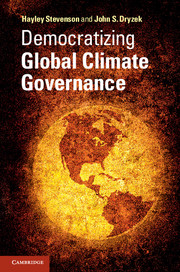Book contents
- Frontmatter
- Contents
- List of Tables
- Preface
- Acknowledgments
- List of Acronyms
- 1 The challenge of global climate governance
- 2 Global climate governance as a deliberative system
- 3 Governance with and without institutionalized authority
- 4 Authoritative global governance
- 5 Emerging centers of networked authority
- 6 Transmitting public concerns in the deliberative system
- 7 Accountability
- 8 Improving the global deliberative system
- 9 Conclusion
- References
- Index
3 - Governance with and without institutionalized authority
The importance of public space
Published online by Cambridge University Press: 05 June 2014
- Frontmatter
- Contents
- List of Tables
- Preface
- Acknowledgments
- List of Acronyms
- 1 The challenge of global climate governance
- 2 Global climate governance as a deliberative system
- 3 Governance with and without institutionalized authority
- 4 Authoritative global governance
- 5 Emerging centers of networked authority
- 6 Transmitting public concerns in the deliberative system
- 7 Accountability
- 8 Improving the global deliberative system
- 9 Conclusion
- References
- Index
Summary
Introduction
In this chapter we examine a form of global democratization that minimizes the need to establish new formal institutions or reform existing ones. It does so by operating in the informal realm of global public spheres and the discourses they contain: in other words, public space. The informal processes we stress could profitably co-exist with reformed public authority at the global level, and in subsequent chapters we will explore how this can be advanced by a deliberative systems approach. In this chapter we provide a way of looking at the prospects for deliberative democratization should the international polity prove resistant to more formally empowered institutions with global reach. The approach we take in this chapter recognizes that the international system remains decentralized and takes this as a basis for pursuing democratization outside formal global institutions. This approach does not mean sidelining the idea of a deliberative system. It is just that any such system will, in light of decentralization, contain multiple locations in which authority is exercised – but nothing much in the way of formal authority at the level of the system as a whole. These multiple locations can include states, corporations, or partnerships of various sorts that can also stretch to the inclusion of non-governmental organizations (NGOs).
- Type
- Chapter
- Information
- Democratizing Global Climate Governance , pp. 37 - 60Publisher: Cambridge University PressPrint publication year: 2014



